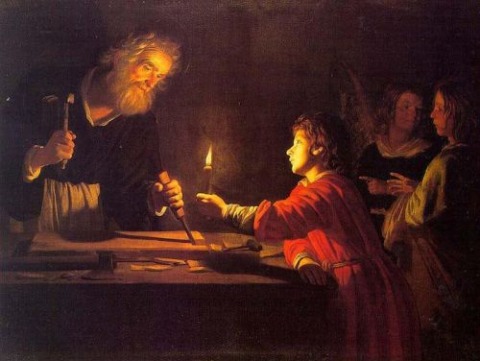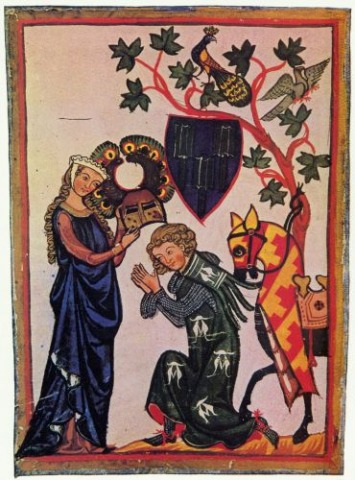
The Underground Thomist
Blog
Fatherly AuthorityMonday, 09-15-2014
"Our inherited family structure had fathers as the notional heads of families, a situation which allowed in practice a good deal of delegated authority to wives and elder children. No doubt this convention of authority subjected many families to the petty tyranny of tiresome fathers, but its overthrow in our generation, while no doubt liberating some families from tyranny, has liberated others from family life altogether.” -- Kenneth Minogue, "The End of Authority and Finality”
|
How Is This Not Incoherent? No. 1Sunday, 09-14-2014
Two stickers, seen on the same bumper of the same van in Austin, Texas: #1: Stop the Dissections: Have Respect for Life. #2: Pro-Choice and Proud of It.
|
Not Safely ForgottenSaturday, 09-13-2014"Government does not rest on force. Government is force; it rests on consent or a conception of justice.” -- G.K. Chesterton, What's Wrong With the World
|
Telling the Truth and Shooting StraightFriday, 09-12-2014
Friedrich Nietzsche claims that each nation “creates” its own good and evil as an expression of its will to power. In Thus Spoke Zarathustra, he puts into the mouth of his title character the aphorism that “A tablet of the good hangs over every people. Observe, it is the tablet of their overcomings; observe, it is the voice of their will to power.” He illustrates with the Persians: ‘Speak the truth and be skilled with the bow and arrow’ – this seemed both dear and difficult to the people from whom my name derives.” When I was in grad school, this argument seemed utterly convincing, as it does to many of my grad students now. How different Herodotus sounds where he says “Persians educate their boys to ride well, shoot straight, and speak the truth” than Torah sounds where it says “Hear, O Israel: The Lord our God is one Lord, and you shall love the Lord your God with all your heart, and with all your soul, and with all your might.” Truly, I thought, there are no universal goods and evils. Each nation sets up its own. But these differences are superficial; they lie in detail and emphasis. The Persians detested lying, but didn’t Torah too? Torah instructs Israel to love God, but didn’t even the idolaters know that deity is to be obeyed? As to telling the truth and shooting straight, don’t all peoples admire the courage and skill of those who fight for the homeland? Nietzsche speaks of overcoming, of doing hard things. But telling the truth was not harder to the Persians than to the Israelites, nor loving God to the Israelites than to the Persians. These things are hard for all nations. The glory of Torah was that it more perfectly expressed what was written on the Persian heart too. (Translation of Nietzsche by Adrian del Caro; of Herodotus, by Andrea L. Purvis; and of Deuteronomy 6:4-5, from the RSV-CE)
|
IndissolubleThursday, 09-11-2014
“Adultery is bad morals, but divorce is bad metaphysics.” -- Charles Williams
|
The Warrior's TeacherWednesday, 09-10-2014“For it was Christian faith that first taught the male warrior a code of courtesy, compassion, and charity, whose first expression was Christian chivalry, whose later expression was the ideal of the Christian gentleman, and whose underlying ideal has been the equality of women and men in baptism, in faith, and in the promises of God. The Christian ideal of equality before God not only did not erase sexual differentiation, but, on the contrary, rested upon that reality as its foundation.” -- Michael Novak
|
ReflectionTuesday, 09-09-2014
In what Freud called sublimation, something that isn’t sublime is stretched out of shape so that it seems to seem different and better. He viewed humans as pressure vessels, and libido as superheated steam. If the pressure keeps building and all the relief valves are jammed, then the walls of the vessel balloon into an unforeseen shape. This, he thought, is how art, religion, civilization, and romantic love arise -- they are merely high-pressure expressions of a thwarted sex drive that cannot be displaced. Does anything like that happen? I doubt it, but I know something that does. Rather than the low putting on airs of the lofty, that which really is high can be reflected or echoed by a lower thing which in some way resembles it. For example, the sexual union of the husband and wife resembles the spiritual union of God with the soul, just because each one is a communion of the Self with the Other. Because of this resemblance, for us sex can never be just sex, as it is with the animals. In humans it reverberates with music, like the strings of a sensitive violin humming with the chords of a more powerful instrument somewhere else. So it is that the love of the human lovers arouses two longings, not one. The first longing is to become one flesh, and can be satisfied by the flesh; the second longing transcends the flesh, and flesh cannot appease it. Some lovers ignore the second longing, trying to become like the animals, mutilating themselves in the attempt. Other lovers admit the second longing, but confuse it with the first. Either they make an idol of carnal love, or else, having discovered that their idol is stone, they fall into sadness and disillusionment. For lovers, the only possible resolution is the one St. Paul speaks of in Ephesians 5, in which the husband and wife submit to the grace by which their love is made a finite likeness of the divine love. He writes, “this mystery is a profound one, and I am saying that it refers to Christ and the Church.”
|





 The Freudian term “sublimation” has come to be used carelessly for two relationships between high and low, relationships which are not only different but even opposite to each other. I illustrate with sex, his obsession.
The Freudian term “sublimation” has come to be used carelessly for two relationships between high and low, relationships which are not only different but even opposite to each other. I illustrate with sex, his obsession.